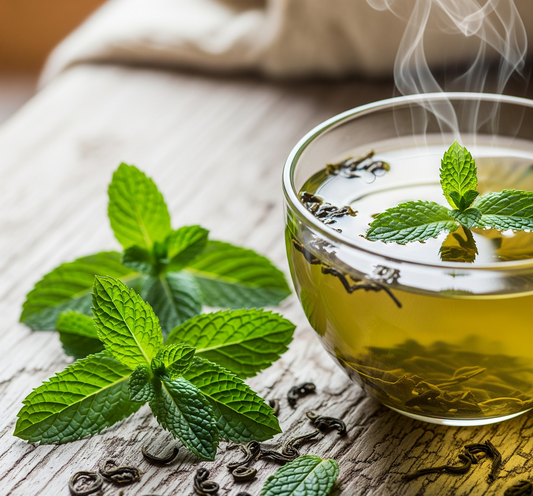This article discusses the benefits of quitting coffee and the challenges that come with it. It highlights black tea as a viable alternative due to its slower release of caffeine, which can help with withdrawal symptoms and provide a more sustained energy boost.
Why Consider Switching from Coffee to Black Tea?
There are a variety of reasons for wanting to break your coffee habit. Cutting out coffee from your diet can improve digestion, reduce anxiety, and give you a brilliant smile without all that dark liquor staining your teeth!
Besides all these wonderful benefits, there are two obvious goals every aspiring coffee quitter wants to achieve: good sleep, and good energy levels.
However, every coffee addict knows that quitting coffee is easier said than done. For one, coffee is delicious. As though that isn’t enough, quitting coffee comes with nasty side effects, bringing on a host of withdrawal symptoms that interfere with your day.
But there’s hope! You’ve come to the right place. In this blog, we’ll compare the levels of caffeine in black tea vs coffee and explore why switching to black tea can be the best decision for your health and energy levels.
Black Tea vs Coffee: Why Switch to Black Tea?
With its quick-release caffeine that gives you a sharp spike of energy and an equally drastic crash hours later, a coffee habit can keep you stuck in the cycle of wired mornings, sluggish afternoons during which you’ll need a pick-me-up, anxious evenings, and trouble getting to sleep at night.
The first few days after quitting coffee tend to be the hardest. Caffeine withdrawal symptoms like throbbing headaches behind the eyes, irritability, grogginess, constipation, lowered blood pressure, and an inability to focus on work, can put up major roadblocks in our day-to-day schedules.
 Often, we tend to return to our unhealthy caffeine habits just because going about our day becomes so difficult while also dealing with caffeine withdrawal.
Often, we tend to return to our unhealthy caffeine habits just because going about our day becomes so difficult while also dealing with caffeine withdrawal.
It’s difficult, but not impossible. While quitting cold turkey can put undue stress on your mind and body, you can address your coffee addiction slowly, by replacing your fast-release caffeine source with a slow-release and balanced caffeine source.
Often, we recommend black tea as a coffee replacement to anyone seeking to quit. This is because black teas offer a similar richness of flavor and aroma that someone with a coffee-loving palette enjoys, while also serving your body healthy doses of caffeine so you can go about your day without feeling all of the nasty headaches and drowsiness!
How Caffeine Works: How much Caffeine in Black Tea vs Coffee?
According to the Washington Post, black tea contains about half the caffeine of coffee (98 milligrams to 47 milligrams per 8-ounce cup). This provides a gentler energy boost without the jitters. And since the caffeine hits your system slower, so you avoid the dreaded caffeine crash.
The amount of caffeine in both coffee and tea depends on the origin of the tea or coffee, the processing method, and the method of preparation which we refer to as brewing.
Though coffee generally contains more caffeine, you can sometimes end up getting more caffeine out of black tea because the lighter brew is easier to re-steep, which is to say that you might be inclined to drink more cups of black tea throughout the day without giving it a second thought.
The Key Difference: How Caffeine is Released in Your Body
The key difference in the caffeine content between coffee versus black tea is how this caffeine is released into your body. Coffee, which is brewed by letting hot water percolate, or passing high-pressure jets of hot water, through roasted and ground beans, tends to collect lower amounts of other bioactive compounds in its liquor than tea does.
On the contrary, loose-leaf or whole-leaf bagged black teas are brewed by allowing whole leaves to unfurl in hot water over a couple of minutes slowly. As the leaves expand, they release an array of bioactive compounds into the water, including caffeine.
 So even if your brand of black tea is on the higher end of the caffeine scale, the proportion of other bioactive in your cup of tea causes tea’s caffeine content to be absorbed more slowly into your bloodstream, giving you a steady source of energy and preventing a caffeine crash. Furthermore, the compound L-theanine can also counteract the effects of caffeine on your body with its calming properties.
So even if your brand of black tea is on the higher end of the caffeine scale, the proportion of other bioactive in your cup of tea causes tea’s caffeine content to be absorbed more slowly into your bloodstream, giving you a steady source of energy and preventing a caffeine crash. Furthermore, the compound L-theanine can also counteract the effects of caffeine on your body with its calming properties.
Black tea has the highest caffeine content among all the varieties of teas. This is why we recommend black tea replacements to coffee lovers trying to cut down on caffeine. Besides the slow-release caffeine that can tide you through withdrawal symptoms, black teas also offer the malty, dense, and robust flavors that are closest to coffee.
Choose from a selection of premium organic black tea from Nepal Tea Collective today!
Black Tea vs Coffee: Our Flavor Recommendations:
As with caffeine levels, the flavor profiles of coffee and black tea both can vary depending on the cultivar of the tea or coffee bush, the region in which the plants were grown, and the processing methods used. Just like coffee, many black teas are also compatible with cream and sugar.
Sometimes quitting coffee is made harder because you crave the taste of your favorite creamer. If this is the case for you, we recommend fragrant Kenyan Earl Grey Blends, especially if you enjoy a splash of vanilla creamer with your coffee. Sri Lankan black teas can also deliver higher caffeine levels with the same boldness as coffee, allowing you to enjoy your caffeine fix with any additive of your choice.
 For the best hit of caffeine and the same malty, rich, and slightly bitter flavor profile, we recommend a summer harvest black tea, like Nepal Tea Collective’s Himalayan Sunrise. With flavor notes of cherry and dark chocolate, Himalayan Sunrise can provide the dark flavors of coffee, along with the caffeine hit you need to start your day.
For the best hit of caffeine and the same malty, rich, and slightly bitter flavor profile, we recommend a summer harvest black tea, like Nepal Tea Collective’s Himalayan Sunrise. With flavor notes of cherry and dark chocolate, Himalayan Sunrise can provide the dark flavors of coffee, along with the caffeine hit you need to start your day.
FAQ’s about Caffeine in Black Tea vs Coffee
Which has more caffeine, black tea or coffee?
Coffee generally has more caffeine than black tea. An 8-ounce cup of coffee contains about 98 mg of caffeine, while an 8-ounce cup of black tea has about 47 mg.
Is black tea a good alternative to coffee?
Yes! Black tea provides a sustained energy boost without the jitters and crash that often come with coffee. It also contains L-theanine, which promotes relaxation.
Does black tea keep you awake like coffee?
Yes, but in a more balanced way. The caffeine in black tea is released more slowly, preventing the sudden spike and crash associated with coffee.
Can I drink black tea every day?
Absolutely! Black tea is rich in antioxidants, supports digestion, and provides a gentler caffeine boost, making it a great daily beverage.
How can I transition from coffee to black tea?
Start by replacing one cup of coffee with black tea each day. Gradually increase your tea intake while decreasing coffee consumption until you fully transition.
Conclusion
To conclude, we’d like to concede (but not too much) and say that both tea and coffee have their perks. While tea can give you calm alertness with its L-Theanine content, and its good, sustained release of caffeine can prevent you from suffering through caffeine crashes, jitters, and anxiety, some studies also suggest that coffee may boost moods, improve brain function, and support liver health.
However, suppose your main goal is to fix your sleep and your caffeine-induced energy fluctuations. In that case, we definitely recommend a good, strong black tea to help you transition from quick caffeine to slow, sustainable caffeine! Try our black teas selection, and see how it goes!
About the Author
Nishchal Banskota is the founder of Nepal Tea Collective, dedicated to offering the finest Nepali teas. With years of experience in the tea industry, Nishchal is passionate about sharing the culture and craftsmanship of Nepali tea with the global tea industry. Learn more about Nepal Tea Collective and explore a variety of award-winning teas that bring you closer to the heart of Nepal.




